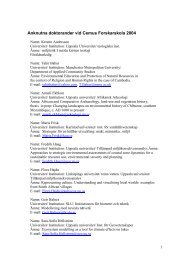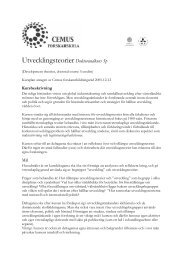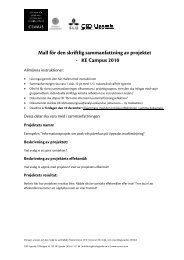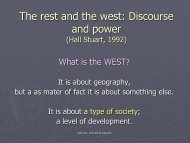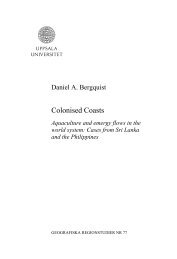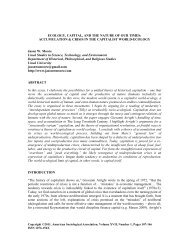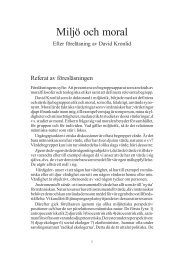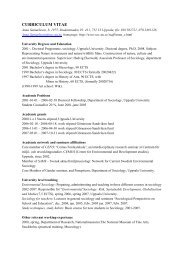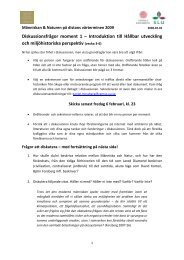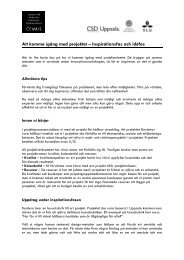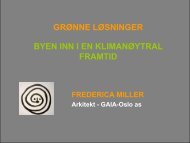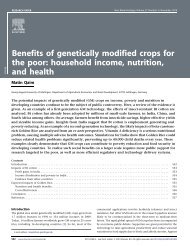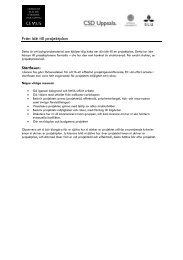The Costs and Benefits of Consuming
The Costs and Benefits of Consuming
The Costs and Benefits of Consuming
Create successful ePaper yourself
Turn your PDF publications into a flip-book with our unique Google optimized e-Paper software.
THE COSTS AND BENEFITS OF CONSUMING 271snowmobiling, from skiing to TV watching. It is importantto realize, therefore, that a substantial amount <strong>of</strong> this energycould be saved without impairing the quality <strong>of</strong> life, <strong>and</strong>perhaps actually improving it.Why is there a negative relationship between energy consumed<strong>and</strong> happiness? <strong>The</strong> answer to this question maysuggest a new way <strong>of</strong> thinking about consuming, one thatmaximizes the quality <strong>of</strong> experience while minimizing theamount <strong>of</strong> entropy produced as a result. <strong>The</strong> reason activitieswith low external physical energy requirements result ingreater happiness is that they usually require greater inputs<strong>of</strong> psychic energy. Having a good conversation makes verylittle dem<strong>and</strong>s on environmental energy, but it dem<strong>and</strong>s concentratedattention <strong>and</strong> mental activity, <strong>and</strong> can be veryenjoyable. So are activities such as reading, gardening,painting, working on crafts, writing poetry, or doing mathematics.In general, people report being happier when theyare actively involved with a challenging task, <strong>and</strong> less happywhen they are passively consuming goods or entertainment(Csikszentmihalyi 1997, 1999).CONSUMING IN THE THIRDMILLENNIUMEver since Adam Smith, we have learned to say thatproduction is justified by consumption; that the needs <strong>of</strong> theconsumer dictate what the economy should provide (Borgmann2000; Smith [17761 1985). This relationship was soobvious to Smith that he did not believe it was worth arguing;ever since, it has become a mantra <strong>of</strong> economics. Inreality, however, the situation has turned out to be exactlythe opposite: it is the imperative to produce that is dictatingthe need to consume. Economic forecasts are based on increasingdem<strong>and</strong>s: unless people buy more houses, morecars, more sporting equipment <strong>and</strong> clothes, the economywill falter. To buy-even if one does not have the means<strong>and</strong> has to fall ever deeper in debt-is a patriotic act. Torefrain from consuming is antisocial; it is seen as a threatto the community. We have locked ourselves into a viciouscycle that forces us to increase entropy in the environmentwithout providing commensurate value.Is there a way to break out <strong>of</strong> this cycle? Obviously, wecould not simply reduce consuming to the level appropriateto satisfy Maslow's survival <strong>and</strong> safety needs-even if wewanted to-without weakening the productive sector <strong>and</strong>causing unemployment to run rampant. But it might be possibleto reinvent consumption in such a way that it wouldsatisfy both existential <strong>and</strong> experiential needs at minimalenergetic costs while at the same time preserving theeconomy.<strong>The</strong> first step in this direction involves a clear accounting<strong>of</strong> the real costs <strong>of</strong> different consumer choices. Eventuallythis should lead to a new sense <strong>of</strong> good <strong>and</strong> bad, beautiful<strong>and</strong> ugly. If the true entropic costs <strong>of</strong> a sport utility vehiclewere kept in mind, for instance, even the most attractivevehicle <strong>of</strong> that sort would seem indecently coarse. Insteadwe would marvel at the beauty <strong>of</strong> a car made <strong>of</strong> bamboo<strong>and</strong> powered by sunlight. But to facilitate this transformationin taste, it will probably be necessary to legislate a newfiscal policy-one that taxed goods in proportion to theamount <strong>of</strong> entropy their production <strong>and</strong> consumptionentailed.Craftspersons, chefs, athletes, musicians, dancers, teachers,gardeners, artists, healers, poets-these are the workerscreating goods that increase human well-being without degradingthe complexity <strong>of</strong> the world. Is it impossible todevelop an economy based on a majority <strong>of</strong> workers <strong>of</strong> thiskind? Where consumption involves the processing <strong>of</strong> ideas,symbols, <strong>and</strong> emotional experiences rather than the breakdown<strong>of</strong> matter? Let us hope this transition is not impossible,because otherwise the future looks grim indeed. And if thetransition does come about, the Journal <strong>of</strong> Conislumer Researchwill be filled with articles about music, art, poetry,<strong>and</strong> dance-the creative energy <strong>of</strong> the new economy.In the meantime, what suggestions does this perspectiveprovide to those doing research in the field? Perhaps themain message is that ignoring the causes <strong>and</strong> consequences<strong>of</strong> consumer behavior is dangerous. It would be unacceptablefor neurologists to study an addictive drug withouttaking into account the pros <strong>and</strong> cons <strong>of</strong> its use. Similarly,research that deals with consumer behavior without consideringthe context in which it is embedded cannot claim tocontribute to basic knowledge, <strong>and</strong> remains little more thanapplied market research.Science proceeds by developing an agreed-upon set <strong>of</strong>measurements <strong>and</strong> definitions. For consumer research to advancein the direction foreshadowed here, it seems thatagreement on the following dimensions should be useful:What are the costs <strong>of</strong> a specific unit <strong>of</strong> consumer behavior,in terms <strong>of</strong> the consumer? <strong>The</strong> social network <strong>of</strong> which theconsumer is a part? <strong>The</strong> ecological network? Such costsmay best be expressed in the common language <strong>of</strong> entropy.Even though entropy is manifested differently in psychological,social, <strong>and</strong> biological systems, at each <strong>of</strong> these levelsit refers to an increase in disorder <strong>and</strong> loss <strong>of</strong> capacity todo work.To balance the costs <strong>of</strong> consumption we should be ableto measure accurately its benefits. <strong>The</strong>se tend to be <strong>of</strong> anegentropic kind, that is, they involve greater order <strong>and</strong>greater disposable energy at the levels <strong>of</strong> the person, thesocial system, <strong>and</strong> the environment. <strong>The</strong>se benefits are notalways congruent with each other. For instance, the purchase<strong>of</strong> a Ferrari may help the self-esteem <strong>of</strong> an executive pushing50, but cause conflict with his wife.Also, it is important to keep in mind that the relationbetween costs <strong>and</strong> benefits is usually quadratic rather thanlinear. Up to a certain point, material resources add greatlyto the quality <strong>of</strong> life. But where is the point <strong>of</strong> inflectionafter which the relationship may no longer exist, or actuallybecome negative?We already know that material possessions alone do notimprove the quality <strong>of</strong> life. We know that excessive concernfor material goals is a sign <strong>of</strong> dissatisfaction with life. Weknow that trying to avoid the mental chaos <strong>of</strong> everyday life



